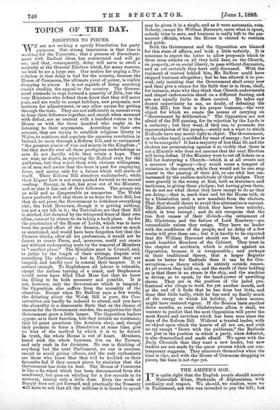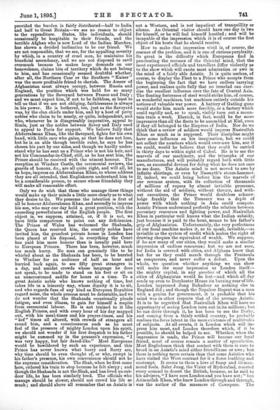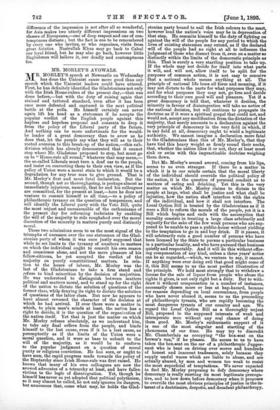THE AMEER'S SON.
IT is quite right that the English people should receive Nasirullah Khan, Shahzada of Afghanistan, with cordiality and respect. We should, we confess, were we in Parliament, ask who was intended to pay the bill; but provided the burden is fairly distributed—half to India and half to Great Britain—we see no reason to object to the expenditure. States, like individuals, should occasionally be hospitable to their friends, and the terrible Afghan who is now Lord of the Indian Marches, has shown a decided inclination to be our friend. We are not responsible, that we see, for the appalling severity by which, in a country of cruel men, he maintains his beneficial ascendency, and we are not disposed to cavil overmuch because he makes large demands on our benevolence, claims bits of territory which do not belong to him, and has occasionally seemed doubtful whether, after all, the Northern Czar or the Southern " Kaiser " was the more profitable friend to cherish. The Ameer of Afghanistan must always occupy, between Russia and England, the position which was held for so many generations by the Savoyard between France and Italy ; and we must expect him, if not to be faithless, at least to tell us that if we are not obliging, faithlessness is always in his power. He is bothered, too, just as the Savoyard was, by the clan chiefs under him, and by a host of petty nobles who claim to be nearly, or quite, independent, and who, whenever he is disagreeably imperative, appeal to Simla, just as the nobles between Savoy and Italy used to appeal to Paris for support. We believe fully that Abdurraisman Khan, like the Savoyard, fights for his own hand, with little care who gains, so that he does not lose, but he is an able though terrible ruler, he says he has chosen his part by our sides, and though we hardly under- stand why he has sent us a Prince who is not his heir, and not his Commander-in-Chief, still, as he has sent him, the Prince should be received with the utmost honour. The reception at Windsor Castle, the ceremonial reviews, the guards of honour, &c., are all quite right, and will all, let us hope, impress on Abdurrahman Khan, to whose address they are all intended, that Englishmen understand him to be a. considerable person, to secure whose friendship they will make all reasonable effort.
Only we do wish that those who manage these things would make up their minds a little more clearly as to what they desire to do. We presume the intention is first of all to honour Abdurrahman Khan, and secondly to impress his son, who may one day hold a great position, with the exceeding powerfulness of the English people. The first object is, we suppose, attained, or, if it is not, we have little competence to point out any deficiencies. The Prince of Wales has welcomed the Shahzada, the Queen has received him, the courtly nobles have invited him, the grandest private house in London has been placed at his disposal, in everything the Court has paid him more honour than is usually paid here to European Princes. There has been, however, much too much hurry. No man can genuinely like to be whirled about as the Shahzada has been, to be hurried to Windsor for an audience of half an hour and hurried back again, to see fifty great strangers in a day, and amidst crowds whose language he does not speak, to be made to stand on his feet or sit on an unaccustomed saddle for hours at a time. To a great Asiatic noble who knows nothing of time, but takes life in a leisurely way, whose dignity it is to sit, and who regards fuss of any kind as European Royalties regard noise, the whole process must be detestable, and we do not wonder that the Shahzada occasionally pleads fatigue, and even illness, to gain for himself a respite from ceremonial labour. He is not trained to it like English Princes, and with every hour of his day mapped out, with his meal-times and his prayer-times, and his " kef " times all altered, with crowds of strangers all round him, and a consciousness such as he must feel of the pressure of mighty London upon his spirit, we should not wonder if his first despatch to his father might be summed up in the peasant's expression, "I was very happy, but fair dazed-like." Most Europeans would be bewildered by such an experience, and this Prince has never known what hurry and flurry are, why time should be even thought of, or why, except in his father's presence, his own convenience should not be the supreme consideration. The Shah, when he first came here, ordered his train to atop because he felt sleepy ; and though the Shahzada is not the Shah, and has lived an out- door life, he has been similarly bred. The officials who manage should be slower, should not crowd his life so much ; and should above all remember that an Asiatic is not a Western, and is not impatient of tranquillity or silence. An Oriental visitor should have one day in two for himself, or he will feel himself hustled ; and will be incapable of the impression which it is of course the first object of his hosts that he should receive.
How to make that impression vivid is, of course, the essence of the problem, and it is one of curious perplexity. So great is the difficulty which Europeans find in penetrating the recesses of the Oriental mind, that the most experienced officials and travellers differ violently as to the show which will excite most admiration or awe in the mind of a fairly able Asiatic. It is quite useless, of course, to display the Fleet to a Prince who accepts from the beginning the fact that we have endless carrying power, and realises quite fully that no ironclad can exer- cise the smallest influence over the fate of Central Asia. The floating fortresses of steel would strike him, of course, as wonderful machines, but machines entirely outside his notions of valuable war power. A battery of Gatling guns would strike him much more forcibly, or a factory which could rapidly and, so to speak, visibly tura out a moun- tain train a week. Elswick, in fact, would be far more impressive than all the fleets to be assembled at Kiel, even if they all belonged to the Empress of India. Nor do we think that a review of soldiers would impress Nasirullah Khan so much as is supposed. Their discipline might have some influence on his imagination, but we could not collect the numbers which would over-awe him, nor if we could, would he believe that they could be carried in thirty days to within sight of Cahill. He is to see the marvels of our machinery, and the triumphs of our manufactures, and will probably regard both with little awe, as successful devices for doing what he does not care to see done. The Asiatic mind is not moved to awe by infinite shirtings, or even by Nasmyth's steam-hammer. If, indeed, we could bring before him the marvels of our revenue system, with its collection of thousands of millions of rupees by almost invisible processes, without the aid of soldiers, without threats, and with- out executions, the Prince would doubtless acknow- ledge frankly that the Treasury was a depot of power with which nothing in Asia could compete. Asiatic Princes understand perfectly the relation between pecuniary resources and fighting power, and Nasirullah Khan in particular well knows what the Indian subsidy, just because it is paid to the hour, means to his father's grip of Afghanistan. Unfortunately, the very perfectness of our fiscal machine makes it, so to speak, invisible,—as invisible as the system of credit which makes the right of drawing cheques the equivalent of wealth. We suppose, if he saw many of our cities, they would make a similar impression of endless resources ; but we are not sure, for India is covered with cities, and Afghans know that but for us they could march through the Peninsula as conquerors, and never suffer a defeat. Upon the whole, we question whether anything we can show will make the same impression as London itself— the mighty capital, in any quartier of which all the cities of Afghanistan would be lost—and which all day sends up even to Dorchester House its buzzing roar of life. London impressed Jung Buhadoor as nothing else in England did ; and though the Nepalese Regent was a man with a genius for government, it is probable that his mind was in other respects that of the average Asiatic. It is to be regretted that Nasirullah Khan will have no opportunity of seeing London turn out in its millions ; but he can drive through it, he has been to see the Darby, and coming from a thinly settled country, he probably realises the force latent in the mere existence of multitudes of subjects. At all events, it is London which will im- press him most, and London therefore which, if it be possible, he should be helped to see. Whether, when the impression is made, the Prince will become our loyal friend, must of course remain a matter of speculation. Most Englishmen think that contact with them is sure to breed in an Asiatic's mind either friendliness or awe ; but there is nothing more certain than that some Asiatics who have visited the West contract for it a fierce loathing and contempt. It seems to them a hive of fussy and ill-man- nered 'fools. Saler Jung, the Vizier of Hyderabad, resisted every counsel to desert the British, because, as he said to his advisers, " I have seen London and you have not; " but Azimoollah Khan, who knew London through and through, was the author of the massacre of Cawnpore. The difference of the impression is not after all so wonderful, for Asia makes two utterly different impressions on two classes of Europeans,—one of deep respect and one of con- temptuous distaste ; but the fact is one to be remembered by every one who invites, or who organises, visits from great Asiatics. Nasirullah Khan may go back to Cabul our loyal friend, but he may also go back, however little Englishmen will believe it, our deadly and contemptuous foe.








































 Previous page
Previous page